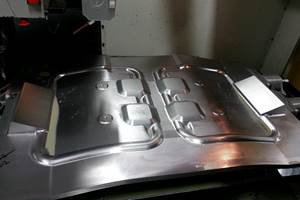Will The Real Estate Bubble Burst?
This is supposed to be a tax column, showing you how to keep money, once you've made it. To this end, let's explore another facet of hanging on to your money.
Share




This is supposed to be a tax column, showing you how to keep money, once you've made it. To this end, let's explore another facet of hanging on to your money. The subject is the economy. The strategy is clear: fatten up your tax savings when you make it or want to pass your money to the next generation. Saving taxes because you sustained losses is a lousy strategy.
It is better not to sustain the losses in the first place. Although I'm concerned about the economy, economics is not my area of expertise. I do, however, spend a small fortune reading investment newsletters. Why, you might ask? I want to enhance my own portfolio, but the main reason is that my clients have an intense interest in their various investments increasing in value and, of course, in being protected from disaster.
Their investments vary all over the map: stocks, bonds, CDs, mutual funds, real estate, annuities, IRAs and others. Often the investments are owned by a family limited partnership (FLIP), which my client manages. Trusts with the client as trustee are common—for the client's family, for charity or for a qualified plan for employees.
My input is usually limited to and based on the best income, gift or estate tax strategies, but economics always play a role and are discussed.
Following are the opinions of others more qualified than I am to discuss the economy. I feel compelled to pass these along to my readers.
This first excerpt was taken from Curtis J. Hessler's "Professional Timing Service," dated March 24, 2005:
"In all probability, the stock market is beginning to anticipate a recession, which will be exacerbated by higher energy prices."
"...There is a major recession in the wings, and it is time for you to begin to prepare for it."
"...and now is the time to look over your stock portfolios and toss out any weak sisters you may be holding. The NASDAQ looks particularly vulnerable to a drop to all-time lows."
From Jim Shepherd's, "The Shepherd Investment Strategist," dated March 11, 2005 My comments appear in brackets: "... I believe the... reason long-term rates remain low is because the bond market, far larger in size than the stock market, is anticipating economic weakness going forward and the lack of inflationary pressures."
"You may wonder: Why would Alan Greenspan [chairman of the Federal Reserve Bank] be ignoring the possibility of the environment that looks most likely to me—namely deflation?... He does not want to go out on the low note of forecasting something so gloomy as a deflationary environment... If he were to give an honest appraisal of the true state of the economy, I believe he would have to confess that the so-called recovery was very much lacking."
[What about real estate?] "I assure you, that a ratio ['price to buy R/E' to 'rent paid' ratio] ...is screaming to us that a housing bubble has not only formed, but is about to burst."
"... It [Jim Shepherd's 'model', which he uses to make his predictions] has us in the proper overall asset class at the right time, and alerts us in advance to imminent changes in the environment. It also provides prior warning of major moves that catch most by surprise such an event is close at hand..."
"I know it is frustrating to await clarification in the model, and yet, true crash scenarios are rare. However, with volatility readings at record lows, with small cap indices at record highs, with oil at record highs, with the aforementioned real estate bubble about to burst, with bullish sentiment amazingly high, the end of this wait is not far off. For some, it will mean devastation; for us, it will mean opportunities, both immediate and in the near future."
"Those who have not yet purchased bonds may put 1/3 of their portfolio into 30-Year U.S. Government T Bonds. The balance should be currently held in 'cash,' namely in short- term government securities or money market funds that only hold short term government securities."
Related Content
4 Commonly Misapplied CNC Features
Misapplication of these important CNC features will result in wasted time, wasted or duplicated effort and/or wasted material.
Read MoreHow to Calibrate Gages and Certify Calibration Programs
Tips for establishing and maintaining a regular gage calibration program.
Read More4 Tips for Staying Profitable in the Face of Change
After more than 40 years in business, this shop has learned how to adapt to stay profitable.
Read MoreTips for Designing CNC Programs That Help Operators
The way a G-code program is formatted directly affects the productivity of the CNC people who use them. Design CNC programs that make CNC setup people and operators’ jobs easier.
Read MoreRead Next
Building Out a Foundation for Student Machinists
Autodesk and Haas have teamed up to produce an introductory course for students that covers the basics of CAD, CAM and CNC while providing them with a portfolio part.
Read MoreRegistration Now Open for the Precision Machining Technology Show (PMTS) 2025
The precision machining industry’s premier event returns to Cleveland, OH, April 1-3.
Read MoreSetting Up the Building Blocks for a Digital Factory
Woodward Inc. spent over a year developing an API to connect machines to its digital factory. Caron Engineering’s MiConnect has cut most of this process while also granting the shop greater access to machine information.
Read More



















.jpg;maxWidth=300;quality=90)











